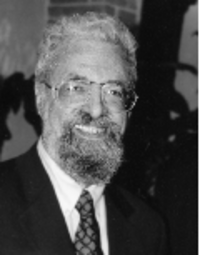
Yulij S. Ilyashenko
The President of the Independent University of Moscow, Editor-in-Chief of the Moscow Mathematical Journal, Vice-President of the Moscow Mathematical Society, our dear friend Yulij Ilyashenko turned sixty in November 2003.
Yulij Sergeevich Ilyashenko has had a profound impact in numerous domains of analysis and geometry (ordinary and partial differential equations, dynamical systems, analytic geometry and foliations). Yet it was the Analytic Theory of Ordinary Differential Equations, and in particular, the investigation of limit cycles of planar vector fields, that always attracted his special attention.
While still a graduate student, he was one of the discoverers of a gap in the Petrovskii–Landis attempted solution of the Hilbert 16th problem on the number of limit cycles of polynomial planar vector fields. Later, around 1980, Ilyashenko realized that Dulac's proof of the finiteness of this number was also erroneous. It took about 10 years of the most intense efforts until he obtained a correct proof (simultaneously and independently, a completely different demonstration was found by J. Ecalle). The finiteness theorem proved by Ilyashenko and Ecalle remains until today a solitary peak that dominates all nearby mountain chains and greatly influences the whole direction of research.
In addition to this landmark contribution, Ilyashenko together with his former and current students created the major part of the comtemporary analytic theory of differential equations—bifurcations of separatrix polygons (polycycles) in generic families, profound results on zeros of Abelian integrals, topology and holonomy of singular foliations (generic properties), nonlinear Stokes phenomena, normal forms of singularities—just to mention a few subtitles. His principal achievements also include the following results:
- the solution of the Hilbert–Arnold problem in the Hamiltonian case for polycycles with elementary singularities: in a generic finite-parametric family the cyclicity of any elementary polycycle is finite and is bounded by a function in the number of parameters;
- algebraic and analytic (un)solvability of local problems of ordinary differential equations: algebraic unsolvability of the center-focus problem, analytic unsolvability of the Lyapunov stability problem;
- geometric theorems on the divergence of normalizing series;
- the Kupka–Smale property of a generic polynomial automorphism of C2;
- an upper bound of the number of limit cycles for Abel polynomial nonautonomous differential equation on the line;
- an upper bound of the Hausdorff and box dimensions for attractors of dissipative dynamical systems, with applications to Navier–Stokes and Kuramoto–Sivashinsky equations.
One should not forget that Ilyashenko was one of the discoverers of yet another gap, this time in Plemel's solution of the Riemann–Hilbert (21st) problem. It is the main claim to fame by the late Andrei Bolibruch, a close friend of Ilyashenko, to discover that in general the solution is negative.
During his whole mathematical life, beginning in his student days at MSU (Moscow State University), Yulij Sergeevich always found time for teaching, with enthusiasm and brilliance. First in mathematics circles and specialized scientific high schools, then in the math department of MSU, where his classes and lecture courses have always been highly appreciated by students. His Differential Equations course at MSU was, for the majority of students, the highlight of their learning experience, and in the last few years often ends with applause and flowers for the lecturer. His Friday evening research seminar is one of the most popular at the department. How he finds time for all his numerous undergraduate and graduate «scientific children» remains a mystery for us.
A decisive trait of Ilyashenko's world outlook is his feeling of personal responsibility for maintaining the traditions of the Moscow Mathematical School—in the face of adversity and global changes. This trait explains why he is one of the «founding fathers» of the Independent University of Moscow and now its President, why he has only a half-time position at Cornell University, why he was one of the main creators and is now one of the two Editors-in-Chief of the Moscow Mathematical Journal, why he is the Vice-President of the Moscow Mathematical Society, why he was instrumental in organizing the French-Russian Mathematics Laboratory in Moscow (an achievement for which, along with his research accomplishements, he was awarded the title of «Chevalier des Palmes Académiques» of France).
Despite all these achievements, Yulij remains a modest and very open person, a family man in the best Russian tradition, passionately working at what he loves most—doing mathematics. Many happy returns of the day!
D. Anosov, V. Arnold, A. Glutsyuk, A. Gorodetski, V. Kaloshin, A. Katok,
A. Khovanskii, S. Lando, A. Sossinsky, M. Tsfasman, S. Yakovenko

